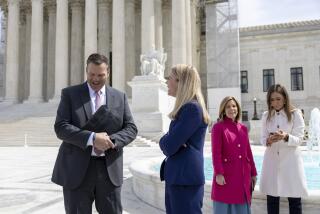THE ABORTION DECISION : ‘Betrayal’ or ‘Courage’: 3 Justices Are Judged : Decision: O’Connor, Kennedy and Souter take the middle ground, and some heat, in break from the right.
- Share via
WASHINGTON — Supreme Court Justices Sandra Day O’Connor, Anthony M. Kennedy and David H. Souter were reviled Monday by Randy Terry, chairman of the Operation Rescue anti-abortion group, for their cowardice and betrayal, but fellow Justice Harry A. Blackmun lauded them for “an act of personal courage and constitutional principle.”
O’Connor, Kennedy and Souter had rejected pleas by the Bush Administration and other anti-abortion advocates to overturn the 1973 Roe vs. Wade decision when they ruled in Monday’s decision on a Pennsylvania abortion case. Instead the three laid down a middle-ground approach to the bitterly divisive issue that preserves the right to abortion but permits the states to regulate it.
O’Connor and Kennedy are appointees of former President Ronald Reagan, who was as vociferous in his opposition to abortion as has been President Bush, who named Souter to the court.
And while the conservative philosophy of the three was clear in Monday’s decision on a Pennsylvania law setting preconditions for abortion, the majority opinion they helped write surprised some by its independent conclusions and its repeated affirmations of what it described as the basic principles of the 1973 decision.
Terry, whose group has attempted to block entrances to abortion clinics, was especially angered by what he saw as a defection of the three justices. “Kennedy, Souter and O’Connor should be ashamed of their cowardice and their betrayal of the children and of justice,” he exclaimed after the vote.
But Blackmun, who authored the 1973 Roe decision, was effusive in his praise: “Make no mistake, the joint opinion of Justices O’Connor, Kennedy and Souter is an act of personal courage and constitutional principle,” he wrote in his concurring opinion.
Monday’s ruling offered new insight into the thinking of the three justices who have emerged as the decisive swing votes on one of the most contentious issues to come before the court in modern times. Though a Reagan appointee, O’Connor in her 11 years on the court had never suggested that she favored an outright overturning of the landmark decision. Neither had she said that Roe should be affirmed.
So she broke new ground personally Monday in declaring, along with Justices Kennedy, Souter, Blackmun and John Paul Stevens, that the 19-year-old decision is “a rule of law and a component of liberty we cannot renounce.”
“The woman’s right to terminate her pregnancy before viability is the most central principle of Roe vs. Wade,” declared O’Connor.
At the same time, O’Connor’s conclusion that some state restrictions on abortions are permissible so long as they do not constitute an “undue burden” on a woman’s right to terminate a pregnancy is consistent with her past positions.
In 1989, when she voted with the majority in a Missouri case to open the way for states to limit access to abortion, she said that she did not accept the assertion contained in the majority opinion that the ruling would “modify and narrow” the Roe decision. And O’Connor made clear at the time that she was not ready to jettison Roe.
Kennedy’s vote perhaps was more surprising because he had voted without qualification to support other conservatives on the court in voting to restrict abortion rights before the Pennsylvania decision. A Reagan appointee like O’Connor, Kennedy always had been counted on by the anti-abortion camp.
In the Missouri case three years ago, Kennedy joined in the majority opinion written by Chief Justice William H. Rehnquist, which said that the court’s decision “would modify and narrow Roe” by permitting some state regulation of abortion during the second trimester of pregnancy for the purpose of “protecting potential human life.”
That opinion sidestepped the larger issue of whether Roe should be overturned.
For Souter, a former New Hampshire state Supreme Court justice appointed to the federal high court by Bush, Monday’s opinion marked his first vote on the abortion issue. During his Senate confirmation hearings two years ago, Souter steadfastly refused to say whether he believed the right to privacy guaranteed a right to abortion.
He did confide to senators that he once had counseled a student on whether to have a pregnancy terminated. But he did not disclose the advice he gave.
It was the third time this month that the three justices had staked out a cautious, moderately conservative position to rebuff the Bush Administration on major issues. The three voted with the majority in a 6-3 decision rejecting an Administration plea that federal judges be sharply restricted in re-examining the convictions or sentences of state prisoners, and they prevailed in a 5-4 decision last week that banned prayers at public school graduation ceremonies.
More to Read
Get the L.A. Times Politics newsletter
Deeply reported insights into legislation, politics and policy from Sacramento, Washington and beyond. In your inbox twice per week.
You may occasionally receive promotional content from the Los Angeles Times.










